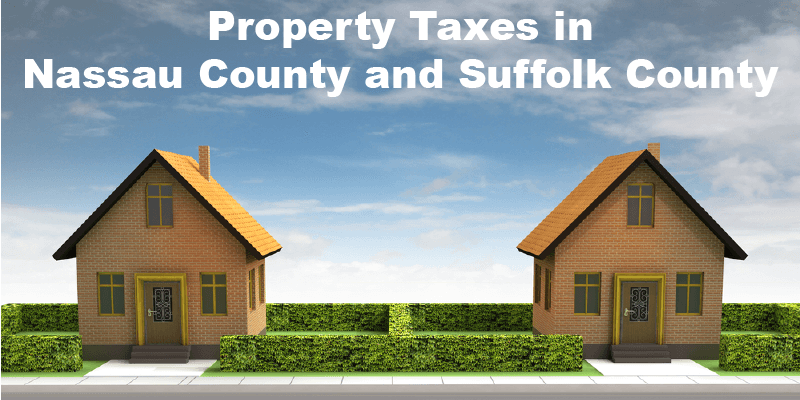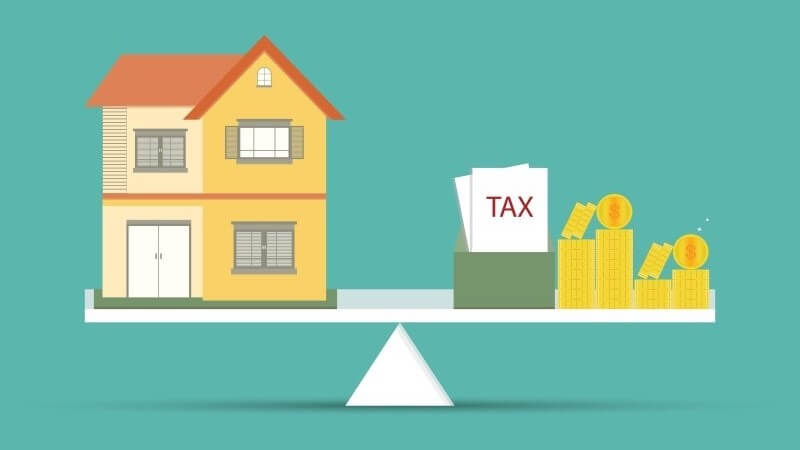It’s no secret that Long Island property taxes are high. In fact, New York City suburbs pay the highest taxes in the nation. While the average effective property tax rate in Manhattan is just 0.88%, and the statewide average rate is 1.69%, Nassau County and Suffolk County average over 2%, according to SmartAsset. It is important to note that property taxes provide the most resources for Long Island municipalities to fund public schools, deliver road maintenance, and finance police and fire departments. In New York State, municipal governments assess your property taxes.
How Are Property Values Assessed in Nassau vs. Suffolk County?
Nassau County and New York City will assess properties at full market value. For all other counties, state law requires that each municipality assess property at a uniform percentage of market value. For example, if the market value of your home is $400,000, but assessments in your community are at 20% of market value, your property assessment should be $80,000. The municipality’s assessment of your property will be equal to a set percentage of market value as determined by the local assessor’s office.
How Does My Jurisdiction Determine Tax Rates?
Initially, a tax jurisdiction will adopt a budget. After adopting a budget, the taxing jurisdiction notes the amount of money collected from state aid, sales tax, and other sources of revenue other than property tax. The total amount calculated from these various streams of income will be subtracted from the budget. The remaining number is called a tax levy, or the total amount of money raised from property owners within the jurisdiction. The tax levy directly influences what you will pay in taxes.
How is My Property Tax Rate Determined?
The jurisdiction divides the tax levy by the total taxable assessed value of properties within your municipality. So, the tax rate is equal to the tax levy divided by all taxable assessments in the jurisdiction multiplied by $1,000. (Tax rates are typically based upon $1,000 of assessed value.) For example, you live in the hypothetical town of Smallville, which carries a tax levy of $1,000,000. The town’s taxable assessed value of all the properties within its jurisdiction is $20,000,000.
($1,000,000 ÷ $20,000,000) =.05
.05 x $1,000 = a tax rate of $50 per $1,000 of assessed value
So, if your property in Smallville has a taxable assessed value of $250,000 you would divide that amount by 1,000 and multiple by $50.
$250,000 ÷ 1,000 = $250 250 x $50 = $12,500.
Your property taxes in Smallville would come to $12,500.
What are Long Island Property Tax Rates?
Much like assessing your property value, local governments also set property tax rates instead of the state of New York. Therefore, property taxes vary by location. You should note that your property tax will equal the final assessment amount determined by your municipality multiplied by the local property tax rate. So, if your tax jurisdiction determines that the value of your property is $200,000 and the tax rate is 2%, your tax bill comes out to $4,000. Read on to learn more about the property tax rates in Nassau and Suffolk County.
What is the Nassau County Property Tax Rate?
In Nassau County, the average tax rate is 2.24%, according to SmartAsset. It might be helpful to recall that tax rates vary by municipality, and the tax rate for one town might differ slightly from the next even if they are located in the same county. If the Department of Assessment valued your property at $500,000, then your property tax would come out to $11,200. The tax money is used to fund schools, road maintenance, and police and fire departments in your township.
What is the Suffolk County Property Tax Rate?
In Suffolk County, the average tax rate is 2.37%, according to SmartAsset. If your market value is $500,000, the local assessment office will assess your property value at a percentage of market value. If assessments in the community are at 90% market value, then the house is assessed at $450,000. Therefore, in Suffolk, if the tax rate is 2.37% and your property is assessed at a percentage of the market value for $450,000, then your property tax bill comes out to $10,665. Of course, this example does not reflect the actual market value of your community.
Can I Dispute My Property Assessment and Taxes?
If you’re a homeowner in a town located in either Nassau or Suffolk County, you may feel that the local Department of Assessment has valued your property for more than it’s worth. If this is the case, you may benefit from filing a tax grievance in Suffolk or Nassau County. Read on to learn more about how to grieve your property taxes in Long Island.
What is a Tax Grievance?
When the municipality you reside in assesses your property for more than it’s worth, or you feel like you’re already paying more taxes than you can afford, you have the right to request a tax grievance. You can either file the tax grievance yourself or hire a tax grievance company. If you choose to hire a tax grievance company, the company will conduct its own assessment of your property. If it determines that your municipality has over-assessed your property or that your taxes are higher than they should be, then the tax grievance company can begin the tax reduction process for you. However, if the tax grievance company cannot determine that your property has been over-assessed, you will be informed that there is no viable tax grievance case. Moreover, your neighbor’s tax assessments do not determine the taxes on your property. Other homes in your neighborhood may be under-assessed by the municipality, but you cannot compare your neighbor’s property value to the value of your property.
Can I File a Tax Grievance for My Business in Nassau County or Suffolk County?
Similar to your personal property, a property tax reduction can also be made for a commercial property. The general guideline is that a grievance may be filed if a municipality imposes a tax on a property and the property owner pays the taxes. If your commercial property is located in Nassau County, but you live in Suffolk, then you can still file a tax grievance in the town’s jurisdiction where your business is located. Regardless of whether you want to file a tax grievance on a commercial property or personal property, a tax grievance company works hard to get you the lowest tax reduction possible.
Need Help Grieving Your Property Tax in Long Island?
If you’re a homeowner in Suffolk or Nassau County, you know how expensive paying Long Island property taxes can be. If you need assistance in appealing your property’s value and reducing your property taxes, give us a call in Nassau County: (516) 342-4849 or Suffolk County: (631) 302-1940. We will not charge you a single penny until we have your taxes reduced.




